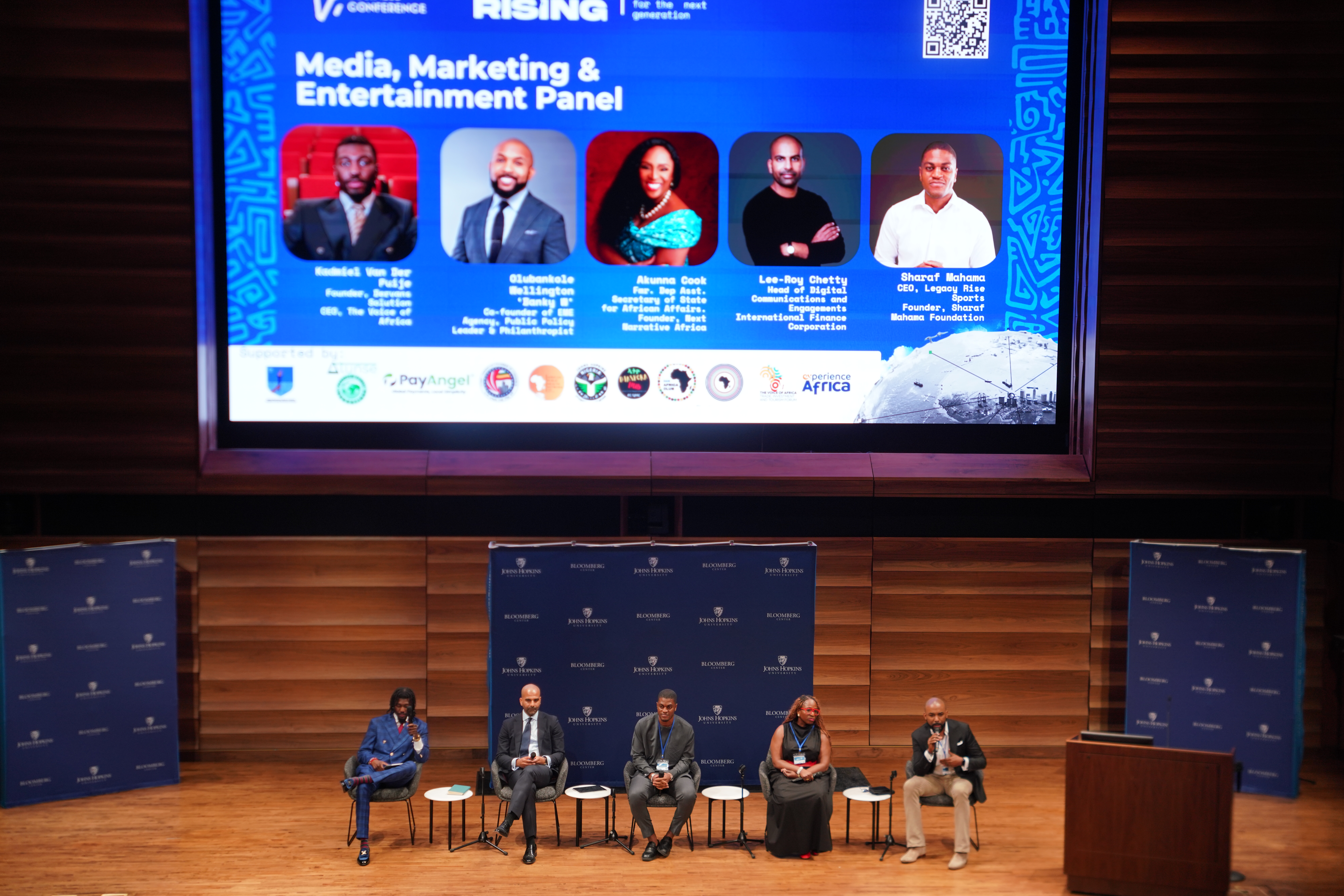Media, Marketing & Entertainment: The Powerhouse Panel at the 6th Africa Business Conference at John Hopkins Bloomberg Center
The 6th Annual Africa Business Conference, hosted by the Africa Business Club at Johns Hopkins Carey Business School, convened a compelling panel on “Media, Marketing & Entertainment” that transcended typical industry discussions. Moderated by Kadmiel Van Der Puije of The Voice of Africa, the session featured Lee-Roy Chetty (IFC), Sharaf Mahama (Legacy Rise Sports), Akunna Cook (Next Narrative Africa), and Olubankole “Banky W” Wellington (Artist, Policy Leader, Philanthropist), each offering unique perspectives on shaping Africa’s global image.
Lee-Roy Chetty initiated the dialogue by highlighting the dual-edged sword of digital democratization in African storytelling. While acknowledging its empowering potential, he cautioned against overlooking the burgeoning influence of AI, advocating for an “urgent narrative of empowerment” rather than mere technological adoption. His stark statistic regarding the underrepresentation of African languages online underscored the critical issue of digital inclusivity.
Sharaf Mahama shifted the focus to the dynamic intersection of sports and entertainment as a potent force in redefining global perceptions. His work with Legacy Rise Sports leverages media and marketing not just to showcase athletic prowess but to amplify the athletes’ personal stories and cultural heritage. He firmly stated, “Entertainment and sports are African soft power,” emphasizing their ability to challenge outdated stereotypes on the international stage.
Akunna Cook brought a critical lens to the historical imposition of external narratives on Africa, quantifying the significant economic repercussions of these negative stereotypes. Her organization, Next Narrative Africa, directly confronts this by investing in and promoting authentic African storytelling across various media. Her powerful assertion, “If we allow and continue to allow others to tell us what is Africa, what who are Africans, we will continue to be chasing after a better future as opposed to creating it for ourselves,” resonated deeply.
Banky Wellington, bridging his experiences in entertainment and his current foray into public policy, emphasized the strategic synergy between storytelling and societal change. Through anecdotes from his film projects, he illustrated how entertainment can subtly yet effectively address critical social issues, advocating for a nuanced approach to truth-telling. His transition into policy reflects a broader understanding of the need to shape the enabling environment for Africa’s creative sectors to thrive, recognizing their immense economic and cultural potential.
Collectively, the panel offered a multi-faceted strategy for reclaiming and amplifying the African narrative. Their insights moved beyond conventional industry talk, advocating for:
- Strategic Digital Empowerment: Moving beyond tech adoption to ensure AI and digital platforms serve African agency and inclusivity.
- Cultural Soft Power Leverage: Recognizing and strategically utilizing the global appeal of African sports and entertainment to reshape perceptions.
- Economic Imperative of Narrative Change: Understanding and actively countering the financial costs associated with negative stereotypes through authentic storytelling.
- Policy-Driven Creative Sector Growth: Recognizing the immense potential of Africa’s creative industries and implementing policies to foster their development.
The “Powerhouse Panel” at the Africa Business Conference served as a catalyst, urging a more intentional and collaborative approach to shaping a truthful and empowering global image of Africa, driven by the continent’s own diverse and dynamic voices.








